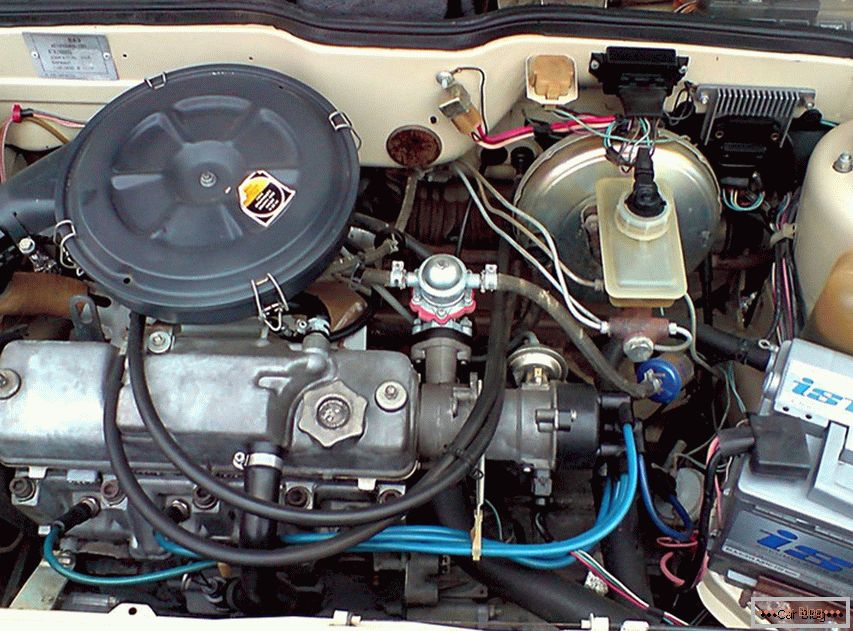If the engine eats oil, the reasons are sometimes quite difficult to identify. Nevertheless, we will try to identify the main factors that may affect the consumption of lubricant in the engine. It should immediately be noted that some oil consumption is inherent in all motors of modern cars. The forced circulation helps to reduce it in part, while the natural loss of the lubricant is reduced. But, no matter how the designers struggle with this problem, the expense still remains, albeit small.
Content
- 1 Main reasons
- 2 Complicated engine breakdowns
- 2.1 Excessive wear of piston oil scraper rings
- 2.2 Cylinder wall wear
- 2.3 Oil leakage due to oil scraps
- 2.4 Leaking gaskets under the cylinder head
- 2.5 Crankshaft oil seals
- 2.6 Failure of the turbine rotor in supercharged engines
- 3 Simple breakdowns
- 4 New cars
- 5 To summarize
Main reasons
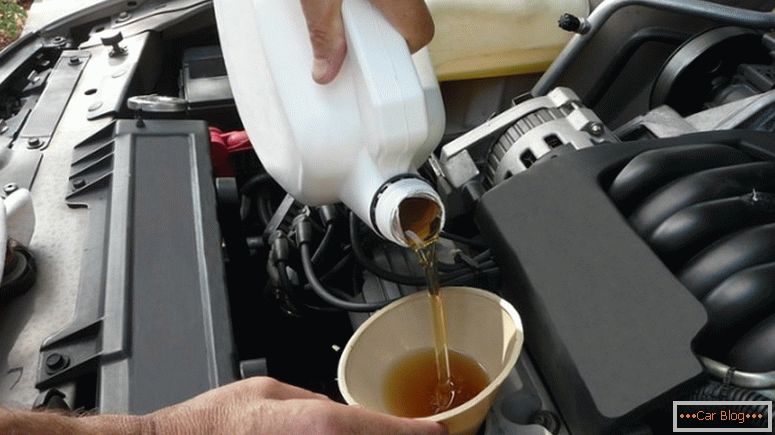
If you have to constantly add oil to the engine, this may indicate serious malfunctions of the engine
Constantly increasing oil consumption often indicates a serious malfunction of the engine. By delaying the diagnosis of the engine, you put yourself at risk of “getting” to costly repairs.
As we have already noted, there is the concept of permissible consumption, it is also called oil consumption for waste, in other words, any internal combustion engine burns a small part of the lubricant in the process. And the whole point is that the oil, circulating in the system, gets almost all the engine elements, including the walls of the cylinders, so that the pistons can move freely inside them.
On the pistons there are special oil scraper rings, which scrape all lubricant residues into the engine pan. But a little bit still remains on the inner surface of the cylinders and burns along with the fuel mixture. In this case, the natural oil consumption should be from 0.05% to 0.25% of the produced fuel. For example, if the engine “consumed” 100 liters of gasoline, the permissible oil consumption should not exceed 25 grams. At least, accordingly, only 5 grams. These are permissible limits, and if there is a deviation in a big direction - there is an excessive consumption of oil and it is time to stop it.
On new engines, oil may not go away at all. True, it is observed at first. As all the mechanisms and assemblies wear out, the flow begins to manifest itself. And if this parameter rolls over, look for a breakdown. It can be both difficult, for which removal it will be necessary to completely disassemble the motor, and easy - without complete disassembly of the engine. Next, we will discuss these faults to help you troubleshoot.
Complicated engine breakdowns
Excessive wear of piston oil scraper rings
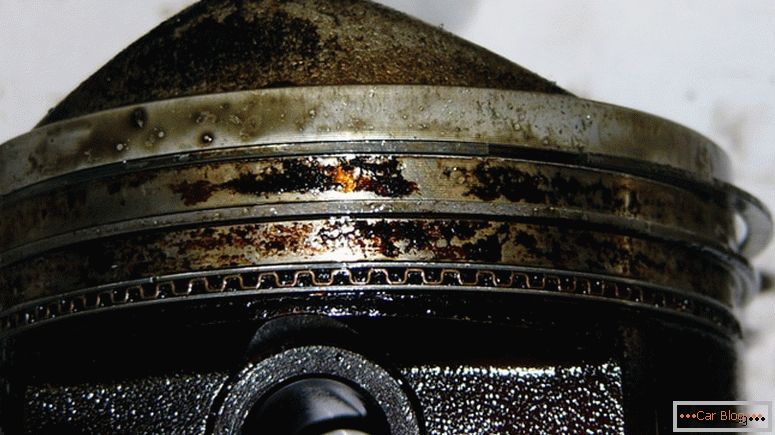
The reason for the increased oil consumption may lie in the problematic piston rings
Any internal combustion engine has oil seals on pistons. They are designed to protect the combustion chamber from ingress of grease. And since the piston rings are in contact with the surface of the cylinder, and this contact is accompanied by constant friction, they are gradually erased. And if there is wear, the gaps increase, through which the oil begins to flow into the combustion chamber and, burning with the fuel, exit through the exhaust system. Also, if the motor overheats strongly, the rings may lie down - become less elastic and press against the pistons. The problem with the rings is usually manifested in the form of blue exhaust. Such a failure is eliminated by replacing the wiper rings, which will cost the car owner dearly.
See also: Why do you need engine running-in after overhaulCylinder wall wear
In this case, it is necessary to squander the cylinder block. There is, of course, an alternative - to completely replace the unit with a new one. But it is likely to cost even more.
Oil leakage due to oil scraps
Колпачки — это сальники из материала, способного выдержать высокие температуры. Когда имеет место чрезмерный износ, то теряется эластичность сальников. Результат – утечка и high engine oil consumption. Чтобы заменить колпачки, вам потребуется проводить работы только с ГБЦ, а это значит, что не придется проводить разборку всего мотора. Пожалуй, этот случай наименее затратный из всех “сложных”.
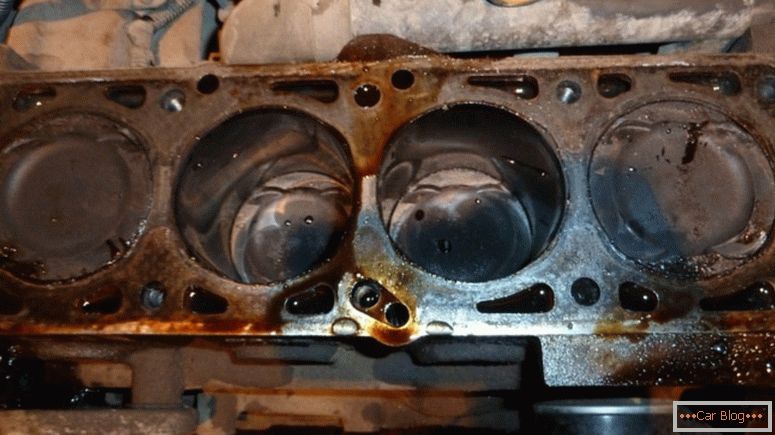
Oil can flow from under the cylinder head gasket
Leaking gaskets under the cylinder head
On new cars, such a defect is extremely rare, as the probability that the factory will not tighten the bolts badly is small, but such a probability does exist. As for the old cars, for them it is not uncommon - the engine wear is already so big that the gasket can burn out. Replacing it will not cause difficulties, since it is enough to remove the head of the unit. After installing the new gasket, evenly tighten the mounting bolts to prevent such a failure from occurring again.
Crankshaft oil seals
They can also leak - with strong wear, low temperature, or the use of low-quality oil, oil seals can simply squeeze out. The cost of the gland is not very big, but enough work for the whole weekend.
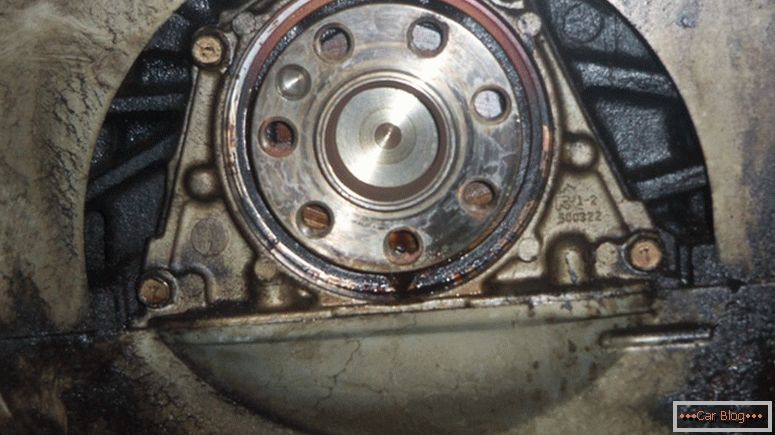
Increased oil consumption may occur due to crankshaft oil seal leak
Failure of the turbine rotor in supercharged engines
Well, if a turbocharger is installed in the car, the leakage may increase exponentially. It is realistic to drain the entire system in a very short period of time if the turbine rotor bushings have worn out. Therefore, if the flow rate has increased, immediately pay attention to whether the supercharger is functioning correctly.
Simple breakdowns
- Grease leakage from the oil filter. The most frequent “simple” breakdown. A characteristic sign - oil stains under the car. The reason - badly tightened the filter housing. The output is obvious - you need to tighten to the end of the filter housing. As a result of such actions, the leak will stop.
- Leak through the cylinder head cover. Usually the lid is fixed with bolts (from 6 to 12 pieces), which may simply be loose. Fixed elementary - tightening the bolts.
- The use of low quality oils. It can also cause high consumption. The fact is that when the lubricant hits the surface of the pistons, it simply burns. Drain it and fill it with fresh, better quality.
- Агрессивный стиль езды. Любите погонять, чтобы мотор взвывал, набирая обороты до предельных? Не забывайте о том, что такой стиль езды вызывает increased engine oil consumption. Можно еще упомянуть и про суровые морозы, так как в зимнее время расход увеличивается. Старайтесь для холодного времени года использовать только качественные масла.
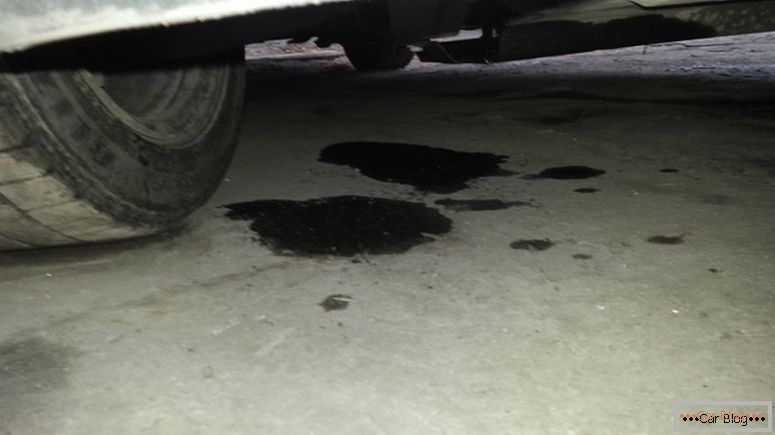
If there are oil stains under the car, you need to check the oil filter - maybe it just is not completely twisted
New cars
Unfortunately, even new cars are not insured against the increased consumption of lubricant. And all because of the honing - the inner surface of the cylinder is not perfectly smooth, but in the form of a fine mesh. This grid also holds a small amount of grease on itself, which later burns with gasoline. In addition, the piston rings on the new engine are also imperfect in shape. As a result, microscopic gaps appear, through which the oil also passes. What to do with this phenomenon? Nothing, just run in the engine. Therefore, the first 3-5 thousand. Km of a new car should be operated in a gentle mode (it is advisable that the motor does not spin more than 3.5 thousand revolutions). Pistons are ground to the surface of the cylinder, and the gaps between them become minimal. During this period (run-in time), the oil consumption is quite large - up to one and a half liters per 10 thousand km. As the grinding parts, it is significantly reduced.
See also: Repair of turbocharging on their ownSome automakers design the engines of their cars in such a way that the permissible oil consumption can reach 1 liter per 10 thousand kilometers and at the same time is normal. Most often, these engines are produced by German concerns. But at a flow rate of more than a liter, it is worth pondering if everything is alright with the engine. Anyway, it is possible to judge any faults only after running in the engine, and not earlier.
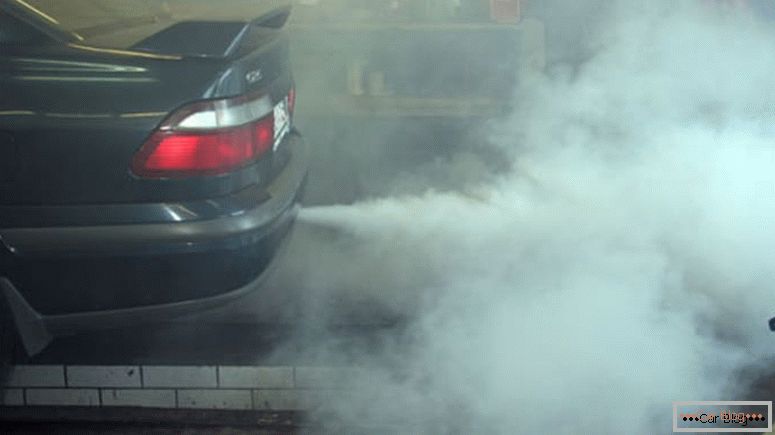
Bluish smoke from the exhaust can indicate malfunctions of the cylinder-piston group
Let's sum up
Oil consumption can be either due to its combustion or banal leakage. And if in order to eliminate the first one with an almost 100% guarantee, it is necessary to open the engine, then the second one can be eliminated on its own. That is why it is worth starting the search for the cause of the increased oil consumption by checking the gaskets and oil seals for leakage. Found something like this - immediately replace the glands and gaskets. Most often, the oil flows from under the valve cover, cylinder head gasket, pan and oil filter. Or flow can give the crankshaft and camshaft oil seals. Eliminate all leaks, or did not find them at all, but the oil still evaporates? So the diagnosis is disappointing - a problem inside the engine.
Pay attention to the exhaust pipe - if, with the engine running, bluish smoke falls from it, the oil burns in the cylinders. This is an abnormal operation of the engine, so the appearance of black soot with oil on the edge of the exhaust pipe is a reason to think. It is better to carry out all faults which elimination requires dismantling of the engine at the service station. The specialist will do everything much better, as he is faced with such cases more often than you. Watch the state of the engine, pour only high-quality lubricant, then there will be no questions why the engine eats oil with such pleasure.


